人教版九年级英语全册 Unit 13We're trying to save the earth!单元测试题
- 格式:docx
- 大小:30.75 KB
- 文档页数:10
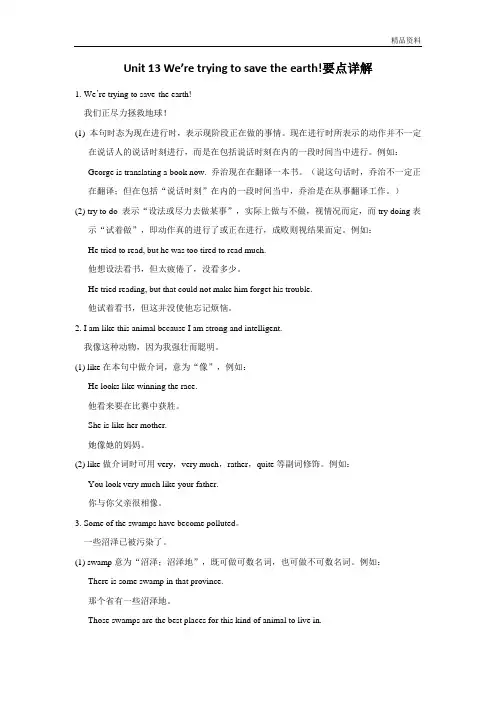
Unit 13 We’re trying to save the earth!要点详解1. We’re trying to save the earth!我们正尽力拯救地球!(1) 本句时态为现在进行时,表示现阶段正在做的事情。
现在进行时所表示的动作并不一定在说话人的说话时刻进行,而是在包括说话时刻在内的一段时间当中进行。
例如:George is translating a book now. 乔治现在在翻译一本书。
(说这句话时,乔治不一定正在翻译;但在包括“说话时刻”在内的一段时间当中,乔治是在从事翻译工作。
)(2) try to do 表示“设法或尽力去做某事”,实际上做与不做,视情况而定,而try doing表示“试着做”,即动作真的进行了或正在进行,成败则视结果而定。
例如:He tried to read, but he was too tired to read much.他想设法看书,但太疲倦了,没看多少。
He tried reading, but that could not make him forget his trouble.他试着看书,但这并没使他忘记烦恼。
2. I am like this animal because I am strong and intelligent.我像这种动物,因为我强壮而聪明。
(1) like在本句中做介词,意为“像”,例如:He looks like winning the race.他看来要在比赛中获胜。
She is like her mother.她像她的妈妈。
(2) like做介词时可用very,very much,rather,quite等副词修饰。
例如:You look very much like your father.你与你父亲很相像。
3. Some of the swamps have become polluted。
一些沼泽已被污染了。
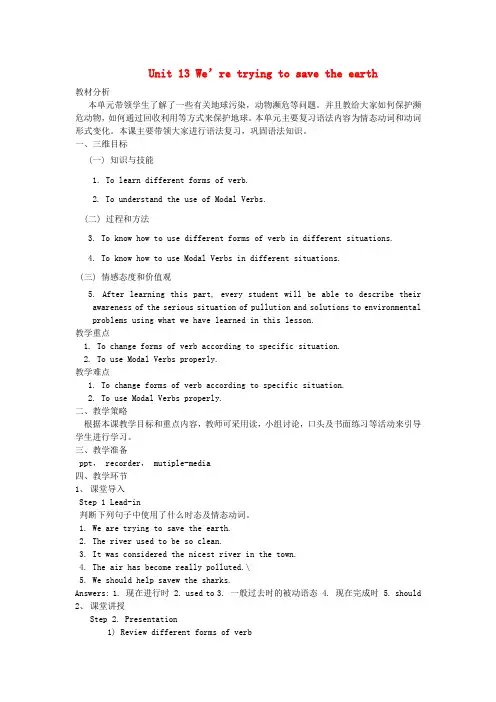
Unit 13 We’re trying to save the earth教材分析本单元带领学生了解了一些有关地球污染,动物濒危等问题。
并且教给大家如何保护濒危动物,如何通过回收利用等方式来保护地球。
本单元主要复习语法内容为情态动词和动词形式变化。
本课主要带领大家进行语法复习,巩固语法知识。
一、三维目标(一) 知识与技能1. To learn different forms of verb.2. To understand the use of Modal Verbs.(二) 过程和方法3. To know how to use different forms of verb in different situations.4. To know how to use Modal Verbs in different situations.(三) 情感态度和价值观5. After learning this part, every student will be able to describe theirawareness of the serious situation of pullution and solutions to environmental problems using what we have learned in this lesson.教学重点1. To change forms of verb according to specific situation.2. To use Modal Verbs properly.教学难点1. To change forms of verb according to specific situation.2. To use Modal Verbs properly.二、教学策略根据本课教学目标和重点内容,教师可采用读,小组讨论,口头及书面练习等活动来引导学生进行学习。
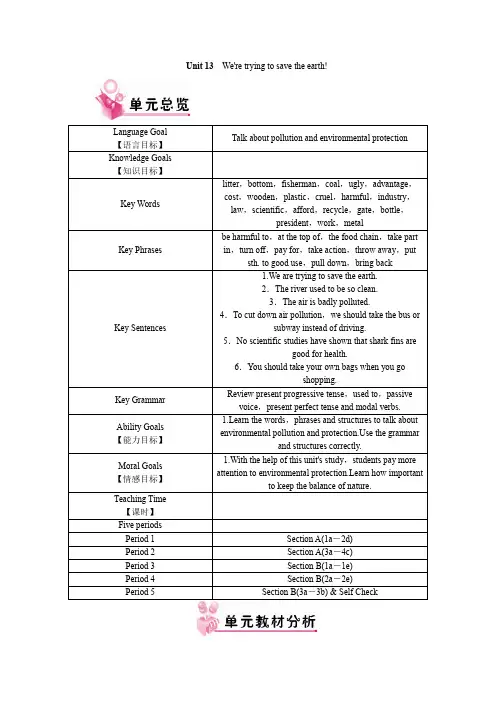
Unit 13We're trying to save the earth!本单元围绕环境保护的话题,并用主题图片表现噪音污染、空气污染、水污染等内容,目的是为了让学生对环境的破坏有一个直观的认识,从而激发学生强烈的社会责任感和对未来发展的思考。
Section A的重点是让学生掌握与环境污染和环境保护相关的词汇和句型,同时引导学生关爱动物、保护环境。
教学难点是让学生学会正确使用连词和结合生活实际讲述如何保护环境。
Section B在Section A所学的基础上,进一步谈论如何保护环境。
教学重点是让学生了解环境保护的方式,并落实到积极的行动当中,同时还有阅读策略和写作技巧的训练。
教学难点是让学生在阅读2a文章之后,根据所给词根找出衍生出的不同词汇,并理解前缀和后缀的不同用法。
The First Period—Section A(1a-2d)Teaching Important Points【教学重点】Key words & phrases:litter,bottom,fisherman,coal,ugly,advantage,cost,wooden,plasticnoise pollution,air pollution,water pollution,be full of,play a part in,turn…into,cut down air pollutionKey sentences:1.Even the bottom of the river was full of rubbish.2.It used to be so clean.3.Everyone in this town should play a part in cleaning it up.4.The air is badly polluted because there are more cars on the road these days.5.The air has become really polluted around here.6.We're trying to save the earth.Key structure:should+do;used to+do;have/has+done;be+done;be+doinge.g.Everyone should help to clean up the river.The air has become really polluted.I used to be able to see stars in the sky.The air is badly polluted.Teaching Difficult Points【教学难点】★Practice the structures to talk about pollution and environmental protection.Teaching Aids【教学工具】A tape recorder,CAI or multimedia courseware.Teaching Steps【教学过程】★Step 1Leading in【新课导入】1.Greeting2.Discussion and reviewDiscuss with the students,like this:T:What kinds of pollution are there these days?S:…T:What causes the pollution?S:…3.Review the words and expressions about the topic.★Step 2Cooperative inquiry【合作探究】1.Finish the task in 1a①Show pictures or play videos about pollution and talk about the pollution.②Read these phrases in 1a.Look at the pictures in 1a and say what they see in the pictures.Write down the words and add more words.③Ask students to say out their words in each kind of pollution.2.Finish the task in 1b①Read the instructions.Get the students to read the contents in the chart and think of what they will fill in the blanks.②Play the recording for the first time.Students listen and fill in the words.③Play the recording a second time.Ask them to check the answers.Then ask the questions.Students answer with full sentences.④Ask more questions to help students learn more details.Then play the recording for the students to role-pay the conversation.3.Finish the task in 1c①Show the key words of the conversation.Ask students to retell the contents in the chart.Like this:What:dirty;bottom,rubbish;fishWhy:littering,putting wasteHow:write to,close down;help to clean up②Read aloud the model dialogue in 1c.Then in pairs,do the oral practice with more words.③Ask two pairs to perform in class.4.Finish the tasks in 2a-2b①Use PPT or pictures to show the four kinds of pollution.Get the groups of students to havea competition to say words about the pollution one by one.land pollution:…air pollution:…noise pollution:…water pollution:…②Get the students to write down these words in their notebooks.③Play the recording for the first time.Students listen and circle the kinds of pollution.Check answers with the class.④Read the sentences in 2b.Predict the contents they will fill in.Play the recording.Students listen and complete the sentences.⑤Play the recording again.Check the answers with the whole class.5.Finish the task in 2c①Read the sample conversation in 2c.Then Read the listening materials and discuss in pairs what causes the two kinds of pollution.②Students work in pairs,making dialogues.③Ask three pairs to role-play their conversations to the class.6.Finish the task in 2d①Talk about the picture in 2d.Ask:What are your ideas for solving the air pollution/waste pollution problem?Present the new words in the conversation.Such as,coal,advantage,wooden,plastic,takeaway,bin,…②Read the conversation in 2d quickly.Find out the problems about environmental pollution in the dialogue.③Read the conversation again.Ask the students to find the ways to solve the problems of air and waste pollution.④Read aloud the conversation by the recording.⑤Learn the useful expressions:What are your ideas for doing…To cut down air pollution,we should…So together,our actions can make a difference and…⑥Role-play or read the conversation in pairs until fluently.★Step 3Homework1.What are your ideas for solving the waste pollution problem?2.Write the words about the four kinds of pollution.3.Translate the following sentences into English.(1)我们正在想办法拯救地球。
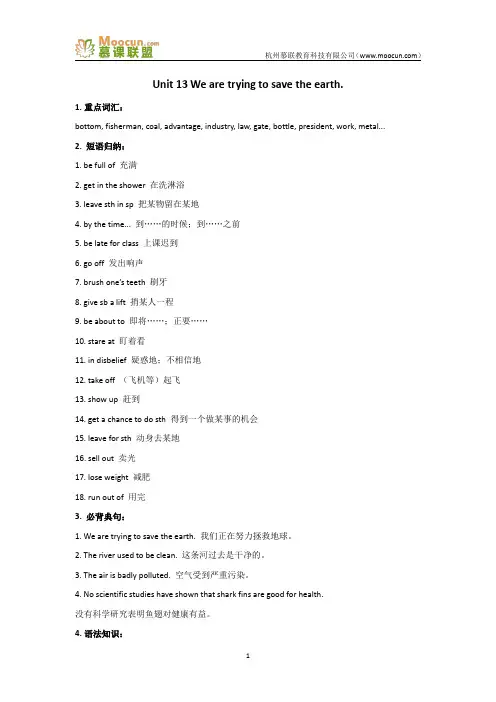
Unit 13 We are trying to save the earth.1.重点词汇:bottom, fisherman, coal, advantage, industry, law, gate, bottle, president, work, metal...2. 短语归纳:1. be full of 充满2. get in the shower 在洗淋浴3. leave sth in sp 把某物留在某地4. by the time... 到……的时候;到……之前5. be late for class 上课迟到6. go off 发出响声7. brush one’s teeth 刷牙8. give sb a lift 捎某人一程9. be about to 即将……;正要……10. stare at 盯着看11. in disbelief 疑惑地;不相信地12. take off (飞机等)起飞13. show up 赶到14. get a chance to do sth 得到一个做某事的机会15. leave for sth 动身去某地16. sell out 卖光17. lose weight 减肥18. run out of 用完3. 必背典句:1. We are trying to save the earth. 我们正在努力拯救地球。
2. The river used to be clean. 这条河过去是干净的。
3. The air is badly polluted. 空气受到严重污染。
4. No scientific studies have shown that shark fins are good for health.没有科学研究表明鱼翅对健康有益。
4.语法知识:英语句子成分分析组成句子的各个部分叫做句子成分。
它包括:主语、谓语、宾语、定语、状语、表语和宾语补足语等。
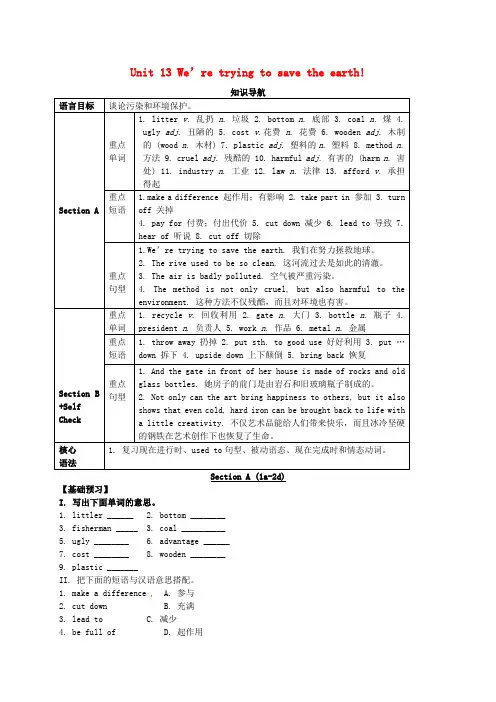
Unit 13 We’re trying to save the earth!知识导航语言目标谈论污染和环境保护。
Section A 重点单词1. litter v.乱扔n.垃圾2. bottom n.底部3. coal n.煤4.ugly adj.丑陋的 5. cost v.花费n.花费 6. wooden adj.木制的 (wood n.木材) 7. plastic adj.塑料的n.塑料 8. method n.方法 9. cruel adj.残酷的 10. harmful adj.有害的 (harm n.害处) 11. industry n.工业 12. law n.法律 13. afford v.承担得起重点短语1.make a difference 起作用;有影响2. take part in 参加3. turnoff 关掉4. pay for 付费;付出代价5. cut down 减少6. lead to 导致7.hear of 听说 8. cut off 切除重点句型1.We’re trying to save the earth. 我们在努力拯救地球。
2. The rive used to be so clean. 这河流过去是如此的清澈。
3. The air is badly polluted. 空气被严重污染。
4. The method is not only cruel, but also harmful to theenvironment. 这种方法不仅残酷,而且对环境也有害。
Section B +Self Check 重点单词1. recycle v.回收利用2. gate n.大门3. bottle n.瓶子4.president n. 负责人 5. work n.作品 6. metal n.金属重点短语1. throw away 扔掉2. put sth. to good use 好好利用3. put …down 拆下 4. upside down 上下颠倒 5. bring back 恢复重点句型1. And the gate in front of her house is made of rocks and oldglass bottles. 她房子的前门是由岩石和旧玻璃瓶子制成的。
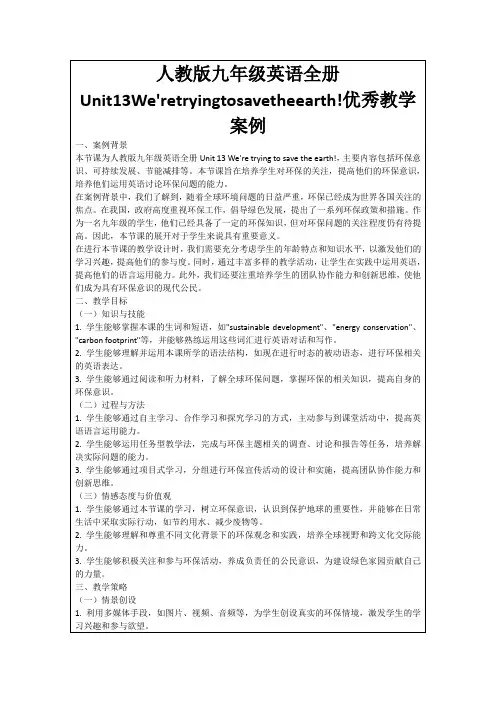
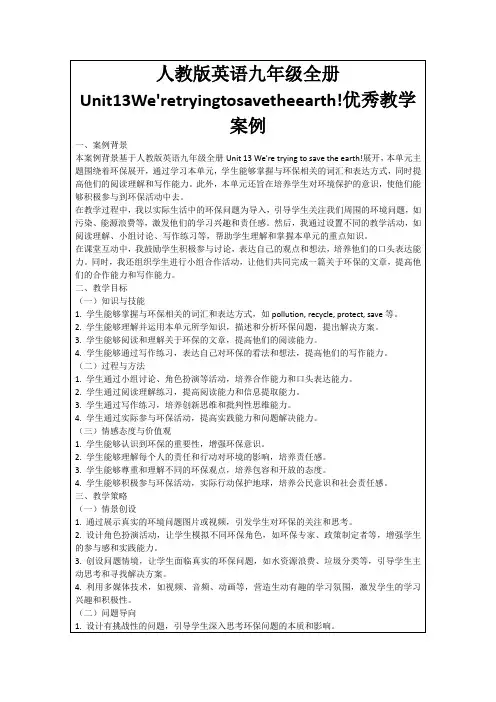
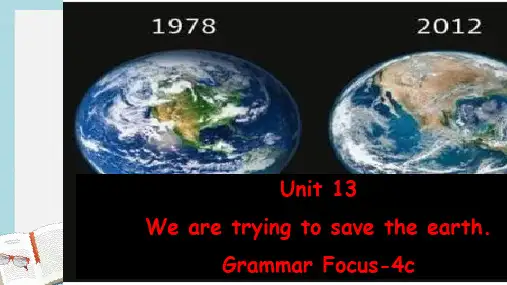
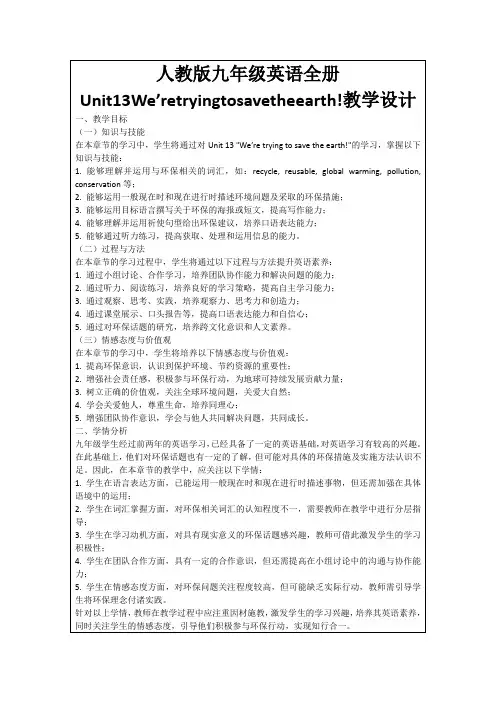
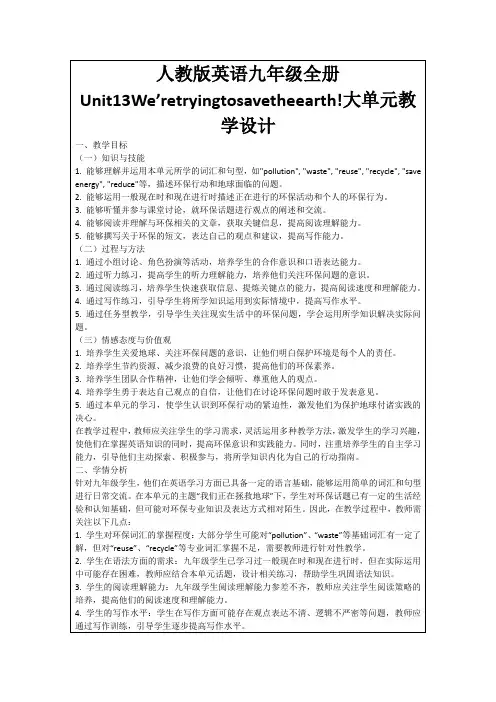
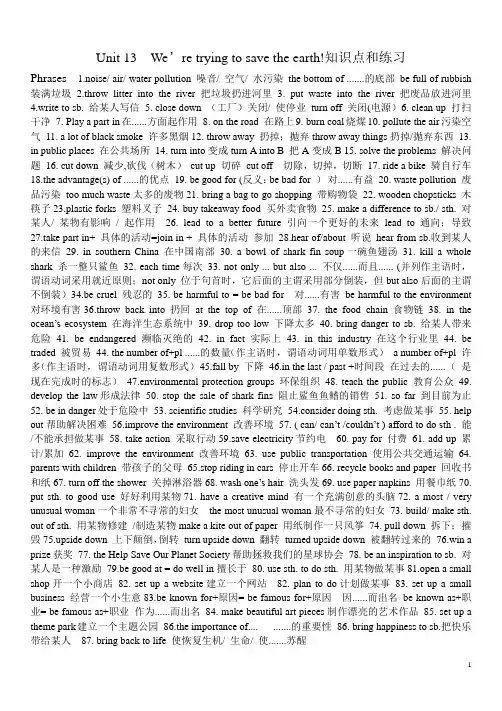
Unit 13 We’re trying to save the earth!知识点和练习Phrases 1.noise/ air/ water pollution 噪音/ 空气/ 水污染the bottom of .......的底部be full of rubbish 装满垃圾 2.throw litter into the river 把垃圾扔进河里 3. put waste into the river 把废品放进河里4.write to sb. 给某人写信5. close down (工厂)关闭/ 使停业turn off 关闭(电源)6. clean up 打扫干净7. Play a part in在......方面起作用8. on the road 在路上9. burn coal烧煤10. pollute the air污染空气11. a lot of black smoke 许多黑烟12. throw away 扔掉;抛弃throw away things扔掉/抛弃东西13. in public places 在公共场所14. turn into变成turn A into B 把A变成B 15. solve the problems 解决问题16. cut down 减少,砍伐(树木)cut up 切碎cut off 切除,切掉,切断17. ride a bike 骑自行车18.the advantage(s) of ......的优点19. be good for (反义:be bad for )对......有益20. waste pollution 废品污染too much waste太多的废物21. bring a bag to go shopping 带购物袋22. wooden chopsticks 木筷子23.plastic forks 塑料叉子24. buy takeaway food 买外卖食物25. make a difference to sb./ sth. 对某人/ 某物有影响/ 起作用26. lead to a better future 引向一个更好的未来lead to 通向;导致27.take part in+ 具体的活动=join in + 具体的活动参加28.hear of/about 听说hear from sb.收到某人的来信29. in southern China 在中国南部30. a bowl of shark fin soup一碗鱼翅汤31. kill a whole shark 杀一整只鲨鱼32. each time每次33. not only ... but also ... 不仅......而且...... (并列作主语时,谓语动词采用就近原则;not only 位于句首时,它后面的主谓采用部分倒装,但but also后面的主谓不倒装)34.be cruel 残忍的35. be harmful to = be bad for 对......有害be harmful to the environment 对环境有害36.throw back into 扔回at the top of 在......顶部37. the food chain 食物链38. in the ocean’s ecosystem 在海洋生态系统中39. drop too low 下降太多40. bring danger to sb. 给某人带来危险41. be endangered 濒临灭绝的42. in fact 实际上43. in this industry 在这个行业里44. be traded 被贸易44. the number of+pl ......的数量(作主语时,谓语动词用单数形式)a number of+pl 许多(作主语时,谓语动词用复数形式)45.fall by 下降46.in the last / past +时间段在过去的...... (是现在完成时的标志)47.environmental protection groups 环保组织48. teach the public 教育公众49. develop the law形成法律50. stop the sale of shark fins 阻止鲨鱼鱼鳍的销售51. so far 到目前为止52. be in danger处于危险中53. scientific studies 科学研究54.consider doing sth. 考虑做某事55. help out帮助解决困难56.improve the environment 改善环境57. ( can/ can’t /couldn’t ) afford to do sth . 能/不能承担做某事58. take action 采取行动59.save electricity节约电60. pay for 付费61. add up 累计/累加62. improve the environment 改善环境63. use public transportation 使用公共交通运输64. parents with children 带孩子的父母65.stop riding in cars 停止开车66. recycle books and paper 回收书和纸67. turn off the shower 关掉淋浴器68. wash one’s hair 洗头发69. use paper napkins 用餐巾纸70. put sth. to good use 好好利用某物71. have a creative mind 有一个充满创意的头脑72. a most / very unusual woman一个非常不寻常的妇女the most unusual woman最不寻常的妇女73. build/ make sth. out of sth. 用某物修建/制造某物make a kite out of paper 用纸制作一只风筝74. pull down 拆下;摧毁75.upside down 上下颠倒,倒转turn upside down 翻转turned upside down 被翻转过来的76.win a prize获奖77. the Help Save Our Planet Society帮助拯救我们的星球协会78. be an inspiration to sb. 对某人是一种激励79.be good at = do well in擅长于80. use sth. to do sth. 用某物做某事81.open a small shop开一个小商店82. set up a website建立一个网站82. plan to do计划做某事83. set up a small business 经营一个小生意83.be known for+原因= be famous for+原因因......而出名be known as+职业= be famous as+职业作为......而出名84. make beautiful art pieces制作漂亮的艺术作品85. set up a theme park建立一个主题公园86.the importance of.... .......的重要性86. bring happiness to sb.把快乐带给某人87. bring back to life 使恢复生机/ 生命/ 使.......苏醒综合测试题一单项选择题()1.I don't think you've been to Disneyland, ________?A.aren't you B.haven't you C.do you D.have you()2.The villager built the bridge ________stones last year.A.out of B.out C.to D.for()3.My brother watched the football match instead of ________ his homework.A.doing B.do C.did D.does()4.—Do you know the movie Harry Potter? —Yes.I________ it twice.It's funny.A.saw B.see C.have seen D.will see()5.More natural protection areas should ________ in the future.A.set up B.to set up C.be set up D.setting up()6.—Do you like playing computer games? —No, but I ________.A.used to B.didn't C.do D.don't()7.I have never________ the strange animal before.A.heard from B.Listened C.listened to D.heard of()8.—Miss Liu, when did you come here?—In 2012.I________ here for two years.A.have been to B.have gone to C.have come D.have been()9.Lots of food and water___to Ya'an, Sichuan Province immediately after the earthquake happened.A.were sent B.are sent C.send D.sent()10.The children were hungry and the salad was quickly________ up.A.eating B.ate C.eaten D.eat()11.Look, so many passengers________ with their smart phones on the underground.A.played B.will play C.are playing D.have played()12.Great changes________ in Daqing since the 1990s.A.took place B.were taken place C.have taken place D.have been taken place ()13.—How much does the car________?—Oh, that's not too dear.It's only 100,000 yuan.A.spend B.cost C.take D.pay()14.—Have you________ the school sports meeting? —Yes, I have.A.take part B.taken part C.taken part in D.took part in()15.—What________ I do? —You'll________ study from now on if you want to go to college.A.can; may B.should; can C.should; have to D.may; could()16.________ he ________ on well with his friends this term?A.Did; get B.Does; get C.is; gotten D.Is; getting()17.Our teacher told us waste bottles should be________ good use.A.put B.put to C.to put D.puts()18.—John, your room is really in a mess.It needs________. —Sorry, Mum.I'll do it at once.A.cleans B.cleaned C.to clean D.to be cleaned()19.It’s time ______ him_____ up. Or he will be late for school.A. Of, to getB. for, to getC. Of, gettingD. for , getting()20.The are so many good restaurants. I can’t decide _____ ?A. what to eatB. how to eatC. where to eatD. when to eat二、完形填空Nancy's grandma lived in a big old house in New York.Nancy and her parents went to see her each summer.Nancy __21__ to see Grandma and bake (烘烤) with her.She liked to play cards with her, too.This summer, however, Grandma did not seem __22__.She seemed to be worried about something.“Wh at's wrong with Grandma?” Nancy asked her mom.“The __23__ pollution is bothering (使烦恼) her,” Mom said.“Do you _24__ the noise from all those cars?” Nancy asked.“Yes,” Mom said.“When Grandma moved here many years ago, there wasn't such a big _25_ here.Now there is a big road that is used to go to work easily in the city.Big trucks deliver (运载) food all over, too, by __26__ this road.They make so much noise.The noise pollution really bothers Grandma.”“I know _27__ water pollution and air pollution are.I learned about them in school, but what is noise pollution?” Nancy asked.“Pollution is __28__ that is bad for you,” Mom said.“Noise pollution can influence someone's __29__.Grandma's blood pressure goes up because of too much noise.She also has trouble __30__ with all the traffic at night.Grandma's hearing has been hurt by the noise, too.”()21.A.loved B.hated C.wanted D.feared()22.A.interesting B.Happy C.healthy D.well()23.A.water B.soil C.air D.noise()24.A.mean B.get C.tell D.point()25.A.factory B.pool C.road D.railway()26.A.cleaning B.using C.building D.making()27.A.what B.how C.where D.when()28.A.everything B.anything C.something D.nothing()29.A.diet B.habits C.health D.feelings()30.A.listening B.sleeping C.walking D.thinking三、阅读理解A large part of China experienced larger amounts of smog (雾霾) than usual and the air was badly polluted.The distance one could see was shorter than 1,000 meters in Beijing, Tianjin, and the provinces of Hebei, Henan, Shandong and Anhui.In some areas, it was down to 200 meters.People usually set off firecrackers (爆竹) to celebrate the Spring Festival.But because of the smog, this year seemed very quiet.It was really different.A man called Zhang Wei said that his friends and he hadn't set off a single firecracker.“We all suffered from last month's smog.If we don't call an end to the firecrackers, the environment will get worse and worse during t he holiday.” Said Zhang Wei.He called on more people to set off fewer firecrackers during this year's Spring Festival holiday by putting up a notice in his neighborhood.More Chinese looked forward to celebrating the holiday in a greener way.They decided not to set off firecrackers.They also decided not to waste food.They said that the new celebrations sounded fashionable.To clean the sky, more than ten provinces including Guangdong, Zhejiang and Jiangsu have started to use national 4 standard (标准), which is expected to reduce (减少) vehicle emission (车辆排放) by 30% to 50%.Beijing even has started to use the stricter national 5 standard.We still have a lot to do to improve the air quality.For example, using public transportation as much as possible is not a hard thing for us to do, but it matters a lot.()31.What happened in a large part of China this January?A.It experienced larger amounts of smog. B.People set off lots of firecrackers.C.There was a heavy rain. D.Many car accidents happened.()32.How do people usually celebrate the Spring Festival in China?A.By putting up a notice B.By setting off firecrackers.C.By not wasting food. D.By using public transportation.()33.How many provinces have started to use national 4 standard?A.Three. B.Six. C.Eight. D.More than ten.()34.Which of the following is NOT true according to the passage?A.Zhang Wei didn't set off a single firecracker this Spring Festival.B.We should use more public transportation to help reduce the air pollution.C.Zhejiang has started to use national 4 standard to reduce vehicle emission.D.More Chinese think the celebration of setting off firecracker is fashionable.()35.What's the best title for the passage?A.How to Reduce the Vehicle Emission B.How to Improve the Air QualityC.What Do Chinese Do in the Spring Festival D.Using Public Transportation四、首字母填空Travel can teach kids more than a textbook. Travelling with kids is good f 1 them. They can find new interests. Travel makes information alive for kids, and makes it much more exciting than studying textbooks or d 2 experiments in the lab. While traveling, they learn h 3 to deal with new situations, and communicate with other people. They learn patience, because sometimes i 4 takes a long time to get to some exciting or interesting places.I’ve been traveling since I was seven years old. For me, to stop traveling would be like taking something a 5 from my soul(灵魂). I can’t live without traveling and I wouldn’t be who I am if I don’t travel. Some people think it’s h 6 to travel after having kids. But in my opinion, when people become parents, it doesn’t m7 they couldn’t travel any more. My children have been traveling since they were three weeks old.Bringing a new life into the world comes with many responsibilities(责任)and I’d love to be a good mother. One of my duties is to e 8 my children. I’m so thankful that my parents took me on family trips when I was y 9 .I’ve learned that the outside world is more colorfu l than the little one I was living in. Of course, I want to pass these travel e 10 on to my children.I value the memories I have traveling with my children. I’m sure they will always remember them in their lives.1. 2. 3. 4. 5.6. 7. 8. 9. 10.1When his friend Bob saw him, he laughed and said, "What has 2 to your hair, Jack?"Jack said, "I tried a new barber's shop today, because I wasn't quite satisfied(满意的) with my 3 one, but this one seems even 4 ."Bob agreed. "Yes, I think you're right, Jack. Now I'll tell you 5 to do when you go into a barber's shop next time: look at all the barber's hair, find out 6 hair looks worst, and then go straight to him.""Why shall I go to him?" Jack asked. "But that would be foolish!""Oh, no, it wouldn't," answered Bob. "Who 7 that man's hair? Just think it. He couldn't cut it 8 , could he? Another of the barbers cut it. So you know he can't be the worst barber."1. 2. 3. 4. 5. 6. 7. 8.六.书面表达我们知道,由于环境污染、人类的残杀,很多野生动物濒临灭绝。
英语人教新课标九(全)Unit 13 We’re trying to save theearth!教案(SB)Section B 1 (1a—2e)I. RevisionRole-play this conversation.A: I think that everyone should use public transportation.B: I disagree. It’s difficult for parents with young children to use public transportation…A: But we can do other things. For example, we can go to school on foot.B: You are right. We should turn off the lights when we leave the room.II. Leading in(1) Tell students we should do these things to protect the environment.Turn off the lights when you leave a room;Stop riding in cars;Stopping using paper towels or napkins;Recycle books and paper.Turn off the shower while you are washing your hair.You can help reduce pollution by putting that soda can in a different bin.Don’t use paper napkins.(2)What can we do to help save the earth? Rank these items from the easiest (1)to the most difficult(5). (1a)______stop riding in cars______recycle books and paper______turn off the lights when you leave a room______turn off the shower while you are washing your hair______don’t use paper napkins(3) Compare your answers in 1a with your partner.III. Listening 1c&1d(1)Listen and check (√) the things that Julia and Jack talk about.(2)Check ( ) the things that Julia is doing now, the things she will do in thefuture and the things she would never do.(3)Check the answers with the whole class.(4)Listen again and answer the questions below.①Who read a book?②Would Julia turn off the shower when she is washing the hair?③Does Jack live close to school?Get one student to write the answers on the blackboard.Keys: Jack.No, she would never do that.Yes, he does.IV. Practice(1)Make a conversation using the information from the chart in 1c. Say what istrue for you.(2)Guessing gameShow some pictures to students and get them to guess what these things aremade from.V. ReadingUse pictures to presentation the new words.(1)Read the passage and answer the questions below①Who is Amy Hayes?②How many people are mentioned in the passage? Who are they?Keys: She is a unusual woman in the UK.Three. They are Amy Hayes, Jessica Wong and Wang Tao.(2)Read the passage and complete the chart below.Keys:Amy Hayes•windows and doors of old buildings that have been pulled down•an old boat•rocks•old glass bottles(n.瓶子)a houseJessica Wongold clothes; especially old jeansbagsWang Taoiron (n.铁) and other materials from old carsbeautiful art pieces(3)Read paragraph 2 and answer the questions.①Did she win an award? What was it from?②Where did her windows and doors come from?③What does the sentence “she lives in a house in the UK that she built herselfout of rubbis h” mean?Keys:Yes, she did. It was from the Help Save Our Planet Society.They came from old buildings around her town that were pulled down.她住在英国,房子是她自己用废弃物建造而成。
人教版英语九年级Unit 13《We’re trying to save the earth》全单元说课稿一. 教材分析人教版英语九年级Unit 13《We’re trying to save the earth》全单元主要围绕环保主题展开,通过学习本单元,学生能够掌握与环保相关的词汇和表达方式,了解人们为保护地球所采取的行动,提高环保意识。
本单元包括两个阅读文本,分别是关于地球一小时活动和一位美国学生的环保故事。
通过阅读和实践活动,学生能够提高阅读理解能力,培养运用英语进行交流的能力。
二. 学情分析九年级的学生已经具备了一定的英语基础,能够理解和运用一些基本的英语表达。
但他们在阅读理解,尤其是对于长篇阅读材料的理解上还存在一定的困难。
此外,学生对于环保主题的认识和关注程度不同,因此在教学过程中需要引导学生深入思考,提高他们的环保意识。
三. 说教学目标1.知识目标:学生能够掌握本单元的重点词汇和表达方式,理解阅读文本的内容。
2.能力目标:学生能够运用英语进行阅读理解,提高阅读能力;能够运用所学知识进行交流和讨论。
3.情感目标:学生能够增强环保意识,认识到保护地球的重要性。
四. 说教学重难点1.重点:本单元的重点是让学生掌握与环保相关的词汇和表达方式,提高阅读理解能力。
2.难点:学生对于阅读文本的理解和运用所学知识进行交流和讨论。
五. 说教学方法与手段1.教学方法:采用任务型教学法,引导学生通过阅读、讨论、实践活动等方式,提高英语运用能力。
2.教学手段:利用多媒体教学设备,展示相关图片和视频,帮助学生更好地理解文本内容。
六. 说教学过程1.导入:通过展示地球环境的图片,引导学生思考环保问题,激发学生的学习兴趣。
2.阅读理解:学生自主阅读文本,回答相关问题,教师进行讲解和指导。
3.小组讨论:学生分组讨论,分享各自的观点和感受,教师进行巡回指导。
4.实践活动:学生根据所学内容,进行角色扮演或写作练习,教师进行评价和指导。
Unit 13We're trying to save the earth!Ⅰ.单项选择(共15小题;每小题3分,满分45分)()1.Ben is a foreign teacher. So far, he ________ in Beijing for five years.A.was teachingB.has taughtC.will teach()2.Books are made ________ paper while paper is mainly made ________ wood.A.of; of B.from; ofC.of; from()3.—The house price has been rising in the past two years.—Yes, I cannot ________ to buy a small apartment even with my parents' help.A.want B.affordC.solve()4.—Do you know the girl ________ is helping the old man.—Oh, that's my sister.A.whom B.whoseC.who()5.—What were you doing at 10 o'clock yesterday?—I ________ on the grass and drawing a picture.A.was sitting B.satC.am sitting()6.If I have enough money, I ________ a school bus to help the poor children go to school.A.buy B.boughtC.will buy()7.I love the school ________ I have studied for six years.A.where B.whenC.that()8.It's getting dark. Please ________ the light.A.turn on B.turn offC.turn down()9.Farmers have become ________ in our hometown in recent years.A.more and more richB.richer and richerC.more rich and more rich()10.I bought a new sweater last weekend. It ________ me 120 yuan.A.paid B.take C.cost()11.That man ________ be my English teacher. He has gone to Canada.A.needn't B.mustn'tC.can't D.shouldn't()12.After washing your hands, please ________ the tap.A.turn up B.turn downC.turn off()13.________ rubbish into the river is harmful ________ the fish in it.A.Throw; to B.Throwing; withC.Throwing; to()14.The students in this school are made ________ school uniforms on Monday.A.to wear B.wearingC.wear()15.—It's too late. I have to go now.—Oh, it's raining heavily outside. You'd better stay ________ it stops.A.until B.sinceC.whileⅠ.阅读理解(共5小题;每小题4分,满分20分)It is reported that some developed countries have shipped broken parts of computers to China. Last month Hong Kong officers found 131,000 kilograms of broken computers, TVs and phones sent from Japan.Things like these are called electronic waste, or ewaste. Dealing with it is not an easy job. Every time an old computer breaks down, it needs to be dealt with safely. What is worse, at present, broken computer parts are usually buried. It may be hundreds of years before they are really gone in the earth.Many places in China are polluted by ewaste. Guiyu in Guangdong Province is one of them. This town is named as “the ewaste capital of the world”. It has to deal with 1.5 million kilograms of ewaste each year, from which it makes 75 million yuan. But it comes at a cost. Many of the poisons in ewaste find their way into the environment. An environmental group has found the air, the earth and the rivers in Guiyu are badly polluted.Luckily, the Chinese government wants the country to change the situation. China has passed a new environmental protection law, the strictest one we have ever had. Computer companies like Lenovo and Dell are asked to take back their old computers. Hopefully, the problem with ewaste will be solved in the near future.()16.The ewaste found in Hong Kong last month was from ________.A.France B.JapanC.Germany()17.The underlined word “buried” probably means “________” in the passage.A.焚烧B.降解C.回收()18.The town of Guiyu in Guangdong Province ________.A.is the ecapital of the worldB.has serious ewaste pollutionC.deals with ewaste safely()19.Chinese government has________.A.closed some computer companiesB.asked people to hand in their old computersC.made a new environmental protection law()20.The passage is mainly about ________.A.the ewaste problem in ChinaB.the cost of burning ewasteC.the ways to deal with ewasteⅠ.任务型阅读(共5小题;每小题4分,满分20分)阅读短文,捕捉信息,根据短文内容完成文后的句子。
The problems with the environment is becoming more and more serious. You may think it is the government's job to take action and it is difficult for the individual (个人) to protect the environment. In fact,there are several easy things that can be done to make a difference.You can start your action by learning to recycle. Although this appears really simple, there are many people who still throw glass bottles and metal cans (金属罐) into their common rubbish bins. Do you notice that our government has put many special rubbish bins in public places? They all have glass and metal recycling signs. If you spend a few seconds washing the cans and bottles and put them into the rubbish bin, you will be on the path to protect the environment.One more big waste product is newspaper. Most people will take their newspapers and throw them into rubbish bins when they finish reading them. In fact, there are many other things you can do with an old newspaper. For example, newspapers are something useful for cleaning windows. You can clean windows with newspapers rather than paper towels and window cleaners for a perfect shine.What else you can do is walking a bit more. Many people usually get into their cars and drive one block to get cola at the local shop. If you walk to the shop, you can not only spend less time, because you needn't try to find a parking place, but you will save money on oil. If you wish to save even more on oil, take the chance to share the same car with others.21.The environment is getting ________. Though individual power is small, you can do several things ________ to make a difference.22.The government has put many special ________________ with glass and metal recycling signs in public places to get people ________ waste like glass bottles and metal cans.23.The writer thinks ________ are another big waste product and he advises people to use newspaper to ________________________.24.Walking to the local shop instead of driving can not only save your ________ but also your ________.25.In this passage, the three examples tell you that protecting the environment is not as ________ as you imagine and that ___________________________________________________________ _____________is a way to protect the environment.Ⅰ.根据语境或句意,用所给词的适当形式填空(共5小题;每小题3分,满分15分)26.It's very hard ________ down the air pollution. (cut)27. I couldn't afford ________ any longer. (wait)28.We should keep our school clean instead of ________ here and there. (litter)29.He used to be________ “Little Tiger”. (call)30.That player's success is an________ to us all. (inspire)Ⅰ.1.B 2.C 3.B4.C先行词是the girl,指人,在定语从句中作主语,关系代词用who。